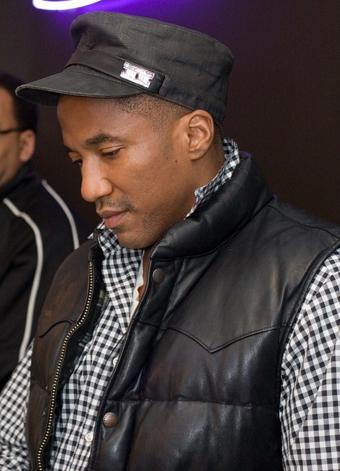Kennedy Center’s Next Season Mixes Old With New
By • March 18, 2016 0 904

Judging by all the buzz and attention on social media and elsewhere, you’d think the Kennedy Center had become hip hop nation after Kennedy Center president Deborah Rutter announced that the center would launch its first Hip Hop Culture Series for the 2016-2017 season and that the noted emcee and rapper and record producer Q-Tip would become the Artistic Director for Hip Hop Culture.
That was certainly news, and, because it marked a first-ever of its kind to invest heavily into making hip hop a major part of the Kennedy Center culture and regular programming — to go with the rest of its more mainstream offerings — it got a lot of attention in the social media world.
There was a lot more to be talked and think at the 2016-2017 season announcement, not the least of which was the fact that this was the first season that clearly has Rutter’s stamp on it since her arrival, succeeding Michael Kaiser a year and a half ago. As such, the season bears her mark, her sensibilities, which includes a desire for inclusiveness across genres and generations both, an expansiveness and willingness to seek out new artists, new leadership and new audiences, and an acknowledgement that the Kennedy Center is not just a kind of national and (very much so) an international cultural shrine, but a community cultural center for a city that’s booming, changing and perhaps hungry for performance art that addresses the needs and taste of its citizens.
The 2016-17 season seems to be both forward looking and looking to the past, what with the year-long celebration of John F. Kennedy’s 100th birthday. Part of this year’s season, beginning May 17, will be “Ireland 100: Celebrating a Century of Irish Arts and Culture.” Ireland is famous for being John F. Kennedy’s ancestral homeland which has enriched the world’s (and American) culture with its outpouring of literature in the form of novels, plays and poetry, its music and dance.
The Kennedy Center’s leadership will also be expanded and enriched with artist-focused leadership.
“Our team has dedicated a great deal of time reimagining how we can put the artist at the very center of our work here at the Kennedy Center,” Rutter said. “I have invited three very forward-thinking artists , Yo-Yo Ma, Renee Fleming and Q-Tip, to collaborate with us on the deepest levels as we shape the future of the center’s programming and seize our responsibility to represent the performing arts in contemporary culture.”
Named Artistic Advisors at Large, Ma and Fleming will co-host the April 25 Kennedy Center Arts Summit this year. Fleming will curate “Voices”, with presentations in every space at the center, working across genres for singers and songwriters, to include jazz, classical, pop and beyond.
Q Tip, an active member of the pioneering Universal Zulu Nation, said that his new position gives him “the ability to show many lanes and perspectives in which hip hop is breaking and has broken new ground.” Q- Tip emerged in the 1980s as an emcee and part of “A Tribe Called Quest,” which showcased a pioneering blend of jazz and soul samples with a “celebration of African heritage, individualism, fashion and fun.” Although hip hop performance and festivals are not new at the Kennedy Center, its emergence as an important and permanent part of the center is a dramatic step.
The season of “Performances for Young Audiences” will have seven new commissions, featuring works by jazz legend Terence Blanchard, violin superstar Joshua Bell, the Hip Hop Collective B-Fly Entertainment, local dance pioneers Company E, breakbeat poet and playwright Idris Goodwin, poet-performer Marc Bamuthi Joseph and playwrights Kirsten Greenidge and Finegan Kruckemeyer.
Included among the premieres are “Bud, Not Buddy,” written by Greenidge with music and performance by Blanchard, the legendary trumpeter Terence Blanchard (he’s an artist in residence at the center for the season) as well as “The Man With the Violin,” which, you guessed it, is a work based on Bell’s picture book about the time Bell worked as an undercover street musicians at a Washington, D.C., Metrorail station.
Blanchard is also part of the Washington National Opera Season with “Champion,” which he wrote. It’s an opera about welterweight world champion and closet gay man Emile Griffith. Another contemporary opera on the schedule is “Dead Man Walking” by Jake Heggie, whose “Moby Dick” wowed audiences several seasons ago. The opera season kicks off in a more traditional way with Mozart’s “The Marriage of Figaro” and ends with “Madame Butterfly.”
Highlights of the dance and ballet season, under artistic advisor for ballet Suzanne Farrell, include Damian Wentzel’s “Demo” series, Alexei Ratmansky’s “The Little Humpbacked Horses” and Michelle Dorrance’s “The Blues Project” and Alvin Ailey.
Also on the innovative side, the theater series will include “The Gabriels: Election Year in the Life of One Family,” a three-play series written by Tony-award winner Richard Nelson (“The Apple Family”).
On the National Symphony Orchestra front, this season marks the last for maestro Christoph Eschenbach. It’s a season that includes “Slava at 90,” a celebration of the former NSO music director, two programs with Music Director Designate Gianandrea Noseda, a residency with Joshua Bell and programming themes that include “Shakespaere at the Symphony.”
If you look at Rutter’s programming and outlook, it’s rich with cross-pollinization, genre mashes, new forms coming out of old forms, programming that is led by individual artists — like Q- Tip, Blanchard, Fleming, jazz director Jason Moran and resident composer Mason Bates and others. It also combines edge, risk with tradition and old favorites, “The Gabriels,” but also “The King and I” and “Wicked,” in jazz Jyoti, and tributes to Ella Fitzgerald and Abbey Lincoln, “Ballet Across America” curated by Justin Peck and Misty Copeland, and “The Blues Project.”

